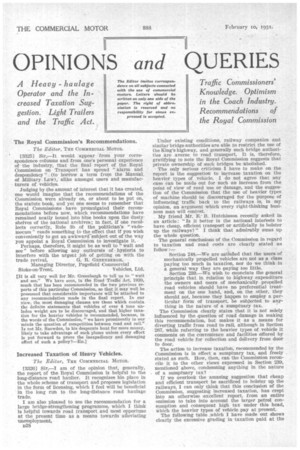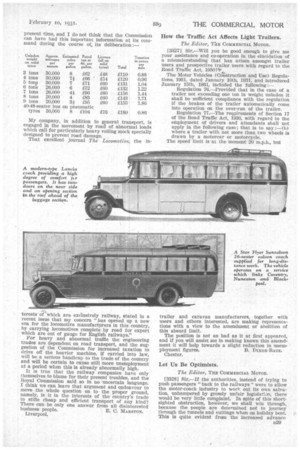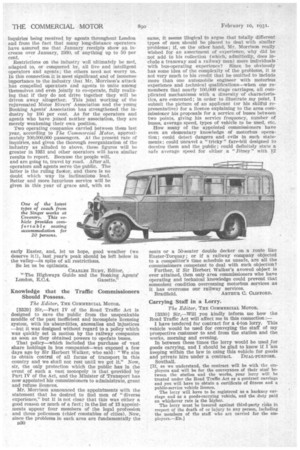OPINIONS and QUERIES
Page 90

Page 91

Page 92

If you've noticed an error in this article please click here to report it so we can fix it.
A Heavy haulage Operator and the Increased Taxation Suggestion. Light Trailers and the Traffic Act.
The Royal Commission's Recommendations.
The Editor, THE COMMERCIAL MOTOR.
[3325] Sir,—It would appear from your correspondence columns and from one's personal experience of the industry, that the final report of the Royal Commission on Transport has spread "alarm and despondency" (to borrow a term from the Manual of Military Law), alike amongst users and mannfa.cturers of vehicles.
Judging by the amount of interest that it has created, one would imagine that the recommendations of the Commission were already on, or about to be put on, the statute book, and yet one seems to remember that Royal Commissions . have promulgated their recommendations before now, which recommendations have remained neatly bound into blue books upon the dusty shelves of the national archives; in fact, if one recollects correctly, Rule 3b of the politician's " vademecum " reads something to the effect that if you wish conveniently to get an awkward-subject out of the way you appoint a Royal Commission to investigate it.
Perhaps, therefore, it might be as well to "wait and see" before allowing any outbursts of hysteria to Interfere with the urgent job of getting on with the trade revival. G. R. GREENBERGH, Managing Director, Pagefield Commercial Stoke-on-Trent. Vehicles, Ltd.
[It is all very well for Mr. Greenberg,h to tell us to "wait and see." We have seen, in the Road Traffic Act, 1930, much that has been recommended in the two previous reports of this particular Commission, so that it may well he presumed that considerable importance will be attached to any recommendation made in the final report. In our view, the most damaging clauses are those which contain the definite statements that vehicles of over 4 tons unladen weight are to be discouraged, and that higher taxation for the heavier vehicles is recommended, because, in the words of the Commission, "we have prominently in our minds the question of competition between road and rail." Is not Mr. Snowden, in his desperate hunt for more money, likely to take advantage of such plums unless every effort Is put forward to prove the inexpediency and damaging effect of such a policy?—En.]
Increased Taxation of Heavy Vehicles.
The Editor, THE COMMERCIAL MOTOR.
[3326] Sir,—I am of the opinion that, generally, the report of the Royal Commission is helpful to the long-distance road haulier. It recognizes his place in the whole scheme of transport and proposes legislation in the form of licensing, which I feel will be beneficial in the long run to the long-distance road haulage trade.
I am also pleased to see the recommendation for a large bridge-strengthening programme, which I think is helpful towards road transport and most opportune at the present time as a means towards alleviating unemployment.
D28 Under existing conditions, railway companies and similar bridge authorities are able to restrict the use of the King's highway, and generally such bridge authorities are averse to road transport. It is, therefore, gratifying to note the Royal Commission suggests that private ownership of such bridges be abolished.
The only serious criticism I have to make on the report is the suggestion to increase taxation on the heavier types of vehicle. I do not agree that any case can be made out for such an increase from the point of view of road use or damage, and the suggestion of the Commission that the use of heavier types of machine should be discouraged for the purpose of influencing traffic back to the railways is, in ray opinion, an argument which every right-thinking business man will contest.
My friend Mr. E. B. Hutchinson recently asked in an article: "Is it better in the national interests to have cheap, efficient transport or artificially to bolster up the railways?" I think that admirably sums up the whole question.
The general conclusions of the Commission in regard to taxation and road costs are clearly stated as follow:— Section 248.—We are satisfied that the users of mechanically propelled vehicles are not as a class paying too much in taxation, nor do we think in a general way they are paying too little.
Section 239.—We. wish to enunciate the general principle that in relation to highway expenditure the owners and users of mechanically propelled road vehicles should have no preferential treatment on the one hand, and, on the other, they should not, because they happen to employ a particular form of transport, be subjected to anything in the nature of a suniptuary tax.
The Commission clearly states that it is not solely influenced by the question of road damage in making this recommendation, but makes it as a means for diverting traffic from road to rail, although in Section 267, while referring to the heavier types of vehicle it comments on the convenience and facilities offered by the road vehicle for collection and delivery from door to door, The action to increase taxation, recommended by the Commission is in effect a sumptuary tax, and freely stated as such. How, then, can the Commission reconcile it to the other views expressed in Section 239, mentioned above, condemning anything in the nature of a sumptuary tax?
If we overlook the amazing suggestion that cheap and efficient transport be sacrificed to bolster up the railways, I can only think that this conclusion of the Commission, suggesting increased taxation, has crept into an otherwise excellent report, from an entire omission to take into account the larger petrol consumption and consequent high tax under this head, which the heavier types of vehicle pay at present.
The following table which I have made out shows clearly the excessive grading in taxation paid at the present time, and I do not think that the Commission can have had this important information at its command during the course of., its deliberation My company, in addition to general transport, is engaged in the movement by road of abnormal loads which call for particularly heavy rolling stock specially designed to prevent road damage. _
That excellent journal The Locomotive, the in
terests of "which are exclusively railway, stated in a recent issue that my concern "has opened up a new era for the locomotive manufacturers in this country, by carrying locomotives complete by road for export which are out of gauge for English railways." For heavy and abnormal traffic the engineering trades are dependent on road transport, and the suggestion of the Commission for increased taxation to drive off the heavier machine, if carried into law, will be a serious handicap to the trade of the country and will be certain to cause still more unemployment at a period when this is already abnormally high. It is true that the railway companies have only themselves to blame for their present troubles, and the Royal Commission said so in no uncertain language. I think we can leave that argument and endeavour to move the whole question on to the proper ground, namely, is it in the interests of the country's trade to stifle cheap and efficient transport of any kind? There can be only one answer from all disinterested business people. E. C. MARSTON. Liverpool.
The Editor, TirlE COMMERCIAL MOTOR.
[33271 you be good enough to give me your assistance and co-operation in the elucidation of a misunderstanding that has arisen amongst trailer users and prospective trailer users with regard to the Road Traffic Act, 19309i, The Motor Vehicles (Construction and Use) Regula tions, 1931, dated January 10th, 1931, and introduced
January 15th, 1931, included the following:—
Regulation 76.—Provided that in the case of a trailer not exceeding one ton in weight unladen it shall be 'sufficient compliance with the regulation if the brakes of the trailer automatically come into operation on the over-run of the trailer.
Regulation. 77.—The requirements of Section 17 of the Road Traffic Act, 1930, with regard to the employment of drivers and attendants shall not apply in. the following case; that is to say :—(b) where a trailer with not more than two wheels is drawn by a motorcar or motorcycle.
The speed limit is at the moment. 20 m.p.h., but trailer and caravan manufacturers, together with users and others interested, are making representations with a view to the amendment or abolition of this absurd limit.
The position is not as bad as it at first appeared, and if you will assist me in making known this amendment it will help towards a slight reduction in unem ployment figures. B. DIXON-BATE. Chester.
Let Us Be Optimists.
The Editor, THE COMMERCIAL MOTOR.
[3328] Sir,—If the authorities, instead of trying to push passengers "back to the railways" were to allow the motor-coach industry to work out its own salvation, unhampered by grossly unfair legislaton, there would be very little complaint. In spite of this shortsighted obstruction, however, we shall win through, because the people are determined not to journey through the tunnels and cuttings when on holiday bent. This is quite evident from the increased advance
inquiries being received by agents throughout London and from the fact that many long-distance operators have assured me that January receipts show an increase over January, 1930, of anything up to 50 per cent.
Restrictions on the industry will ultimately be met, adapted to, or conquered by, all live and intelligent operators and agents; the others need not worry us. In this connection it is most significant and of immense importance to the industry that Mr. Morrison's attack has compelled operators and agents to unite among themselves and even jointly to co-operate, fully realizing that if they do not drive together they will be driven away altogether. This joint working of the rejuvenated Motor Hirers' Association and the young Booking Agents' Association has strengthened the industry by 100 per cent. As for the operators and agents who have joined neither association, they are merely weakening their own position.
Two operating companies carried between them last year, according to The Commercial Motor, approximately 100,000,000 passengers. At the present rate of inquiries, and given the thorough reorganization of the industry as alluded to above, these figures will be greater in 1931 and other operators will have similar
results to report. Because the people will, and are going to, travel by road. After all, operators aria agents serve the public. The latter is the ruling factor, and there is no doubt which way its inclinations lead.
Better and more luxurious service will be given in this year of grace and, with an early Easter, and, let us hope, good weather (we deserve it!), last year's peak should be left below in the valley—in spite of all restrictions.
So let us be optimists.
CHARLES RUDY, Editor,
'" The Highways Guide and the Booking Agents' London, E.C.4. Gazette."
Knowledge that the Traffic Commissioners Should Possess.
The Editor, THE COMMERCIAL MOTOR.
[3329] Sir,—Part IV of the Road Traffic Act is designed to save the public from the unspeakable muddle of the past inefficient and incomplete licensing system, with its absurdities, anomalies and injustices —but it was designed without regard to a policy which was quickly set in motion by the railway companies as soon as they obtained powers to opefate buses.
That policy—which included the purchase of vast share holdings in bus companies—was exposed a few days ago by Sir Herbert Walker, who said: "We aim to obtain control of all forms of transport in this country and we shall not rest until we get it." Now, sir, the only protection which the public has in the event of such a vast monopoly is that provided by Part IV of the Act, and the Minister of Transport has now appointed his commissioners to administrate, grant and refuse licences.
Mr. Morrison announced the appointments with the statement that he desired to find men of "diverse experience," but it is not clear that this was either a good reason or much of a fact; in the list of 13 appointments appear four members of the legal profession and three policemen (chief constables of cities). Now, since the problems in each area are fundamentally the D30 same, it seems illogical to argue that totally different types of men should be placed to deal with similar problems ; if, on the other hand, Mr. Morrison really wished for an assortment of experience, why did he not add to his collection (which, admittedly, does include a tramway and a railway man) more individuals • with bus-operating experience? Since he obviously has some idea of the complexity of the problems, it is not very much to his credit that he omitted to include more than one automobile engineer with motorbus experience and technical qualifications—when one remembers that nearly 100,000 stage carriages, all complicated mechanisms with a diversity of characteriss ties, are concerned; in order to illustrate my point, I submit the picture of an applicant (or his skilful representative) for a licence explaining to the area commissioner his proposals for a service of buses between two points, giving his service frequency, number of buses, average speed, types of vehicle to be used, etc.
How many of the appointed commissioners have even an elementary knowledge of motorbus operation; could detect dangers and evils in such statements; could unravel a " tricky" fare-bill designed to deceive them and the public; could definitely state a safe average speed for either a "Jitney" with 12 seats or a 50-seater double decker on a route like Exeter-Torquay;, or if a railway company objected to a competitor's time schedule as unsafe, are all the commissioners competent to deal with such objection? Further, if Sir Herbert Walker's avowed object is ever attained, then only area commissioners who have operating and technical knowledge could prevent that somnolent condition overcoming motorbus services as it has overcome our railway services.
Bradfield. ARTHUR C. CI1FFORD.
Carrying Staff in a Lorry.
The Editor, THE COMMERCIAL MOTOR.
[3330] you kindly inform me how the Road Traffic Act will affect me in this connection:— I have tendered for contract for a 4-ton lorry. This vehicle would be used for conveying the staff of my prospective customer to and from the station and the works, morning and evening. In between these times the lorry would he used for goods carrying, and I should be glad to know if I 'am keeping within the law in using this vehicle for goods
and private hire under a contract. DUAL-PURPOSE. Southall.
[If, as we understand, the contract will be with the employers and will be for the conveyance of their stale. between the station and the works, your lorry will be treated under the Road Traffic Act as a contract carriage and you will have to obtain a certificate of fitness and a public-service vehicle licence.
The lorry will have to be registered as a hackney carriage and as a goods-carrying vehicle, and the duty paid on whichever rate is the higher.
The lorry must be insured against third-party risks in respect of the death of or injury to any person, including the members of the staff who are carried for the einployers.—ED.]




























































































































































































